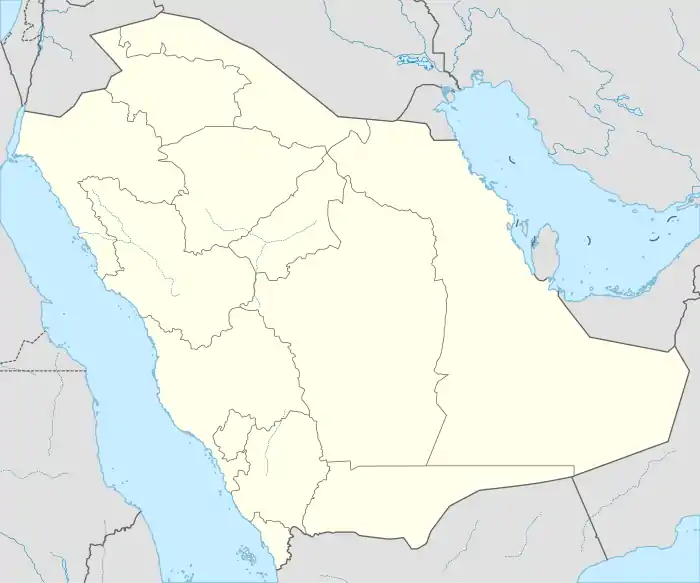Al-Watah ballistic missile base
Al-Watah ballistic missile base is a ballistic missile facility in the low but quite rocky mountains near the town of Al-Watah, Saudi Arabia, 200 km west-southwest of Riyadh.[1]
| Al-Watah ballistic missile base | |
|---|---|
 Al-Watah ballistic missile base | |
| Coordinates | 24.213691°N 44.701952°E |
| Type | Missile base |
| Site information | |
| Owner | Royal Saudi Strategic Missile Force |
| Controlled by | Saudi Arabia |
| Site history | |
| Built | 2007 |
Overview
The analysts think that the base was built no earlier than 2008. The communication tower of the base is situated at coordinates: 24.213691°N 44.701952°E. The base has several underground entry gates, parking slots for mobile launchers and two large launch pads that are identical to ones that can be seen at Chinese DF-3 (CSS-2) Dongfeng missile bases. The liquid-fueled DF-3A is an early Chinese nuclear weapon Intermediate-range ballistic missile and is believed to have a range of 4,000 – 5,000 km with a 2,000 kg warhead.[2] Michael Elleman and Joseph S. Bermudez Jr. stated that the site appears to have a rocket-engine production and test facility.[3]
The launch pads' marks and configuration from satellite images[4] show that the base is 'targeting Iran and Israel with ballistic missiles'.[5]
Construction of the base likely began in 2013.[3]
References
- Sean O'Connor – IHS Jane's Defence Weekly. "Saudi ballistic missile site revealed", IHS Jane's Defence Weekly, 10 July 2013.
- SinoDefence "DongFeng 3 (CSS-2) Intermediate-Range Ballistic Missile" Archived 2013-08-14 at the Wayback Machine, sinodefence, 27 February 2009.
- Sonne, Paul; Harris, Shane (January 23, 2019). "Can Saudi Arabia produce ballistic missiles? Satellite imagery raises suspicions". The Washington Post. Archived from the original on January 25, 2019.
- Colin Freeman – The Telegraph "Saudi Arabia 'targeting Iran and Israel with ballistic missiles", The Telegraph, 10 July 2013.
- Cheryl K. Chumley – The Washington Times "Saudi Arabia targeting Israel, Iran with ballistic missiles, satellite images show", The Washington Times, 12 July 2013.